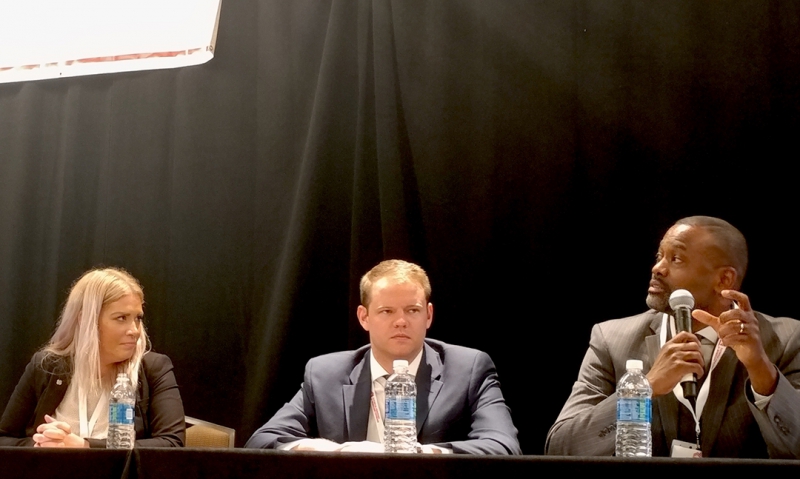
Veterans Employment and Education Division Deputy Director Mark Walker discusses the importance of achieving long-term stability for veterans at risk of, experiencing homelessness and how local VSOs can help
American Legion National Veterans Employment and Education Division Deputy Director Mark Walker participated in a veterans homelessness panel discussion at the 2017 National Coalition for Homeless Veterans Annual Conference that focused on the importance of achieving long-term stability for veterans at risk of or experiencing homelessness.
This year’s theme for the conference, which was held May 31 at the Grand Hyatt Hotel in Washington, D.C., was "Yes, In My Back Yard – Putting Veterans First," which was meant to highlight the need for a veteran-centric system of community services that support housing stability and make homelessness rare, brief and non-recurring. Walker, along with other veterans service organization representatives, discussed accessing VA benefits through local VSO partners and how they provide safe and inclusive spaces in their effort to end homelessness for all veterans.
“We’re very proud members of this organization and we try to do as much as we can for veterans and their families as a whole," said Walker. "But particularly when it comes to homeless veterans, our D.C. office is our advocacy office where we ensure that there’s funding for homeless veteran programs. At the state level we become, in essence, sort of a resource center. If you come to a post or talk to someone, we can connect them to you and/or VA with benefits and other issues so that you can get help.”
The American Legion supports the efforts of public and private sector agencies and organizations that aid homeless veterans and their families, as well as legislative proposals that provide medical, rehabilitative and employment assistance for those individuals. In addition, the Legion recognizes that aiding homeless veterans requires a sustained coordinated effort, which should provide:
• secure housing;
• nutritious meals;
• essential physical health care;
• substance abuse aftercare and mental health counseling; and
• personal development and empowerment.
Walker said the ultimate goal for homeless veterans is total self-management, as the Legion believes they also need job assessment, training and placement assistance.
“How we help within our own organization (is by offering) Temporary Financial Assistance,” he said. “If you are a veteran (eligible for American Legion membership) with minor children (aged 17 or younger), we’ll help you. We’ll give you help with utilities, rent, transportation and things of that nature. For the last three years, we’ve given out over $2 million through (the TFA) program. (These veterans aren’t) actually on the street, but they’re at risk of losing their house. So that’s where we come in and help them with that.”
Furthermore, the Legion has stepped up its support for homeless veterans, coordinating a Homeless Veterans Task Force among its 55 departments to augment homeless service providers and fill in the gaps where no assistance programs are available. All departments have a Homeless Veterans Task Force chairperson and an employment chairperson who are capable of:
• providing assistance to any homeless or financially destitute veteran that contacts them; and
• coordinating activities with Legion posts in their departments to aid homeless veterans and their families, all in effort to prevent future homelessness.
“Our local posts can help with emergency funding, put you in a hotel for a few days, transportation to get you somewhere and things like that,” Walker said. “We do a lot of collaborations at the local level (which includes) SVA, VFW, AMVETS, DAV, PVA, etc. As a VSO community, we provide those resources that you may not have or fill those gaps where we can.”
The Legion’s Veterans Employment and Education (VE&E) Division is governed by a full commission that focuses on veteran employment, business development, education and help for homeless veterans. The commission was formed to ensure veterans receive the opportunity to succeed in civilian life.
VE&E works with like-minded organizations, such as Avue Technologies and Military.com, to sponsor veteran events. In addition, the division works with the Department of Labor and U.S. Chamber of Commerce Foundation to promote and execute veteran job fairs and career expos nationwide.
“Again, we’re here to help as much as we can,” said Walker. “The easy thing is that you can actually just go to www.legion.org and call (one of our posts). Posts may not be open every day, so I could be your go-to guy to find that person in your area. Whether you’re in Maryland or California, I can mediate that relationship between who you need to talk to at the post level and on the department level.”
At the end of 2009, VA and the White House launched a campaign to end all veteran homelessness by 2015. Since 2010, the rate has declined by approximately 47 percent, according to Walker.
Along with various community allies, the Legion remains committed to seeing this goal through, to ensure that every community across America has provisions in place to get homeless veterans into housing and connect those at risk with the local services and resources they need.
Walker said that the commander of Post 15 in Jewett City, Conn., saw veterans sleeping outside, under bridges and on the train tracks and wondered how he could help. “He turned his post into an 18-unit housing facility for homeless veterans. To actually create housing within the post was pretty dynamic, and we’re proud of that,” Walker said.
- Homeless Veterans

